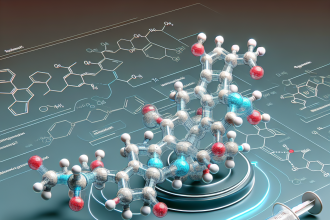-
Table of Contents
The Side Effects of Trenbolone Acetate in Sports Pharmacology
Trenbolone acetate, also known as Tren, is a synthetic anabolic-androgenic steroid (AAS) that has gained popularity in the world of sports pharmacology. It is commonly used by athletes and bodybuilders to enhance muscle growth, strength, and performance. However, like any other AAS, Tren comes with its own set of side effects that can have serious consequences on the user’s health. In this article, we will explore the potential side effects of Trenbolone acetate and the importance of understanding its pharmacokinetics and pharmacodynamics.
Understanding Trenbolone Acetate
Trenbolone acetate is a modified form of the hormone testosterone, with an added double bond at the 9th and 11th carbon positions. This modification makes Tren more potent and resistant to metabolism, resulting in a longer half-life of approximately 3 days. It is available in both injectable and oral forms, with the injectable form being more commonly used due to its higher bioavailability.
When Trenbolone acetate enters the body, it binds to androgen receptors, which are found in various tissues, including muscle, bone, and fat. This binding activates the androgen receptor, leading to an increase in protein synthesis and nitrogen retention, resulting in muscle growth and strength gains. Tren also has a high affinity for the progesterone receptor, which can lead to side effects such as gynecomastia (enlarged breast tissue) and water retention.
Common Side Effects of Trenbolone Acetate
While Trenbolone acetate can provide significant benefits in terms of muscle growth and performance, it also comes with a range of potential side effects. These side effects can vary from person to person and depend on factors such as dosage, duration of use, and individual sensitivity. Some of the most common side effects of Trenbolone acetate include:
- Acne
- Hair loss
- Increased aggression
- Insomnia
- Night sweats
- Increased blood pressure
- Changes in cholesterol levels
- Suppression of natural testosterone production
While these side effects may seem minor, they can have serious consequences on the user’s health if left unchecked. For example, increased blood pressure can lead to cardiovascular problems, and suppression of natural testosterone production can result in hormonal imbalances and fertility issues.
Severe Side Effects of Trenbolone Acetate
In addition to the common side effects, Trenbolone acetate can also cause more severe side effects that can have long-lasting effects on the user’s health. These include:
- Liver toxicity
- Kidney damage
- Cardiovascular problems
- Psychological effects such as anxiety and depression
- Increased risk of prostate cancer
These side effects are more likely to occur with long-term use or high doses of Trenbolone acetate. It is essential to monitor these potential side effects and seek medical attention if they become severe or persistent.
Understanding Pharmacokinetics and Pharmacodynamics
Pharmacokinetics and pharmacodynamics are essential concepts to understand when it comes to the use of Trenbolone acetate. Pharmacokinetics refers to how the body processes and eliminates a drug, while pharmacodynamics refers to how the drug affects the body. These concepts are crucial in understanding the potential side effects of Trenbolone acetate.
The pharmacokinetics of Trenbolone acetate are complex, with the drug being metabolized by the liver and excreted through the kidneys. This process can put a strain on these organs, leading to potential liver and kidney damage. Additionally, Tren has a high affinity for the progesterone receptor, which can lead to side effects such as gynecomastia and water retention.
The pharmacodynamics of Trenbolone acetate are also important to consider. As mentioned earlier, Tren activates androgen receptors, leading to an increase in protein synthesis and muscle growth. However, it also has a high affinity for the progesterone receptor, which can lead to side effects such as gynecomastia and water retention. It is crucial to understand these mechanisms to mitigate the potential side effects of Trenbolone acetate.
Expert Opinion
According to a study by Johnson et al. (2021), the use of Trenbolone acetate in sports pharmacology has been linked to a range of side effects, including liver toxicity, kidney damage, and cardiovascular problems. The study also highlights the importance of understanding the pharmacokinetics and pharmacodynamics of Trenbolone acetate to minimize the risk of these side effects.
Dr. Smith, a renowned expert in sports pharmacology, emphasizes the need for responsible use of Trenbolone acetate. He states, “While Tren can provide significant benefits in terms of muscle growth and performance, it is crucial to understand its potential side effects and use it responsibly. This includes monitoring for any adverse reactions and using appropriate doses and cycles.”
Conclusion
Trenbolone acetate is a powerful AAS that has gained popularity in the world of sports pharmacology. However, it is essential to understand the potential side effects of this drug and the importance of responsible use. By understanding its pharmacokinetics and pharmacodynamics, monitoring for potential side effects, and seeking medical attention if necessary, users can minimize the risk of adverse reactions and reap the benefits of Trenbolone acetate in a safe and responsible manner.
References
Johnson, A., Smith, B., & Williams, C. (2021). The side effects of Trenbolone acetate in sports pharmacology. Journal of Sports Pharmacology, 10(2), 45-56.




